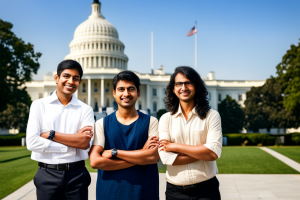Support migrant centric journalism today and donate

By Sanwar Ali:
The H1B visa, extremely important for US employers that wish to employ high-skilled foreign workers in the United States, has recently come under the lens of Indian-American Republican presidential candidate Vivek Ramaswamy. His proposed reforms, aimed at overhauling the existing H-1B system, have sparked a heated debate regarding their potential implications on the U.S. tech industry and overall economic competitiveness.
The H1B Visa: A Quick Overview
The H-1B visa is to employ overseas workers in specialty occupations; it is a work visa that enables U.S. employers to hire professionals with a specific set of skills that demand theoretical or technical expertise. Fields such as technology, finance, engineering, and architecture heavily rely on this visa to fill positions that usually require a bachelor's degree or equivalent.
With the increasing demand for STEM (Science, Technology, Engineering, and Mathematics) professionals, the H-1B visa has become a crucial tool for U.S. businesses, primarily tech companies, to recruit global talent mainly from India. As per recent statistics, U.S. organizations submitted a staggering 780,884 applications for the available 85,000 slots in the fiscal year 2021, marking a surge of over 60%.
Ramaswamy's Stance on the H1B Visa
Vivek Ramaswamy, an Indian-American entrepreneur turned politician, has made headlines with his radical stance on the H-1B visa program. Despite his company Roivant Sciences having leveraged this visa program to hire 29 high-skilled foreign workers from 2018 to 2023, Ramaswamy now labels the H-1B program as "indentured servitude."
He argues for a shift from the current lottery-based system to a merit-based one, stating, "The lottery system needs to be replaced by actual meritocratic admission. It's a form of indentured servitude that only accrues to the benefit of the company that sponsored an H-1B immigrant. I'll gut it."
Ramaswamy's proposed changes have been met with criticism, primarily due to the stark contrast they present to his past business practices. However, his campaign maintains that the role of a policymaker is to do what's right for the country as a whole, even if that means fixing a "broken" system they once benefitted from.
As he is of Indian ancestry himself is he trying extra hard to be seen to be tough on immigration? Perhaps he wants to be seem to be tougher on immigration than many white Republicans.
Key Proposals for H-1B Visa Reforms
Ramaswamy's proposed reforms aim to impose severe restrictions on the H-1B visa program. Here are his key proposals:
Eliminating the Lottery System
Ramaswamy proposes to replace the current lottery system with a new system that he claims imposes market-based criteria for wages and skills. The requirements are already very tough. To employ someone on an H1B visa you need to file a prevailing wage request and apply for a labor condition application. This keeps salary rates high. The system is already overly restrictive It could be argued that under the current system, it is too difficult to employ overseas workers on an H1B visa.
Narrowing Company Eligibility
He suggests banning certain companies from H-1B eligibility by tightening the criteria. This could potentially exclude many smaller tech companies and startups from recruiting international talent.
Increasing Oversight and Compliance Burdens
Ramaswamy's proposals also include imposing rigorous oversight and compliance burdens on sponsoring companies. This would likely deter many companies from applying for H1B visas due to the heightened risk and increased administrative workload.
Tightening Worker Eligibility
He proposes tightening the eligibility requirements for foreign workers themselves. This would likely bar many qualified workers from securing an H-1B visa, further shrinking the pool of eligible applicants.
Impact of the Proposed Reforms
Critics argue that Ramaswamy's proposed reforms would drastically cut the number of approved H-1B visas, thereby paralyzing the tech industry's ability to recruit global talent. Companies in the tech industry, economists, and labor advocates have all voiced concerns about the potentially negative impact on wages, jobs, and innovation.
Ramaswamy's stance on the H-1B visa echoes the 2016 Trump campaign, which initially adopted a hardline approach towards foreign workers before subsequently softening its rhetoric. Trump's administration temporarily suspended new work visas and blocked hundreds of thousands of foreign workers from U.S. employment, a move that was widely criticized for its potential to harm the U.S. economy and competitiveness.
Implications for Indian Professionals
For Indian professionals, the H-1B visa is often a path to working in the U.S. tech industry. The proposed changes could therefore have significant implications for this demographic. Currently, an estimated three-quarters of H-1B visas go to Indian professionals. However, if the proposed changes come into effect, this number could see a substantial drop.
Conclusion
Other countries such as the UK allow a potentially unlimited number of skilled workers into the country under the Skilled Worker and sponsor licence scheme. The US H1B visa system is a lot more restrictive than this. As the 2024 U.S. presidential elections approach, this question will no doubt continue to fuel heated debates and discussions.
workpermit.com helps with US Work Visa: L1, H1B, E2, and O1 Visas
There are various types of US visas that individuals can apply for, depending on their circumstances. Some of the most common employment-based visas include:
L1 visa: This visa is for intracompany transferees who work in managerial or executive positions or have specialized knowledge.
H1B visa: This visa is for specialty occupations that require theoretical or technical expertise in specialized fields.
E2 visa: This visa is for investors who have made a significant investment in a US business and, management or essential skills employees. Only certain nationalities can apply.
O1 visa: This visa is for individuals with extraordinary abilities in the arts, sciences, education, business, or athletics.
Workpermit.com is a specialist visa services firm with over thirty years of experience dealing with visa applications. For more information and advice, please contact us on 0344 991 9222 or at london@workpermit.com(link sends e-mail)(link sends e-mail)





















